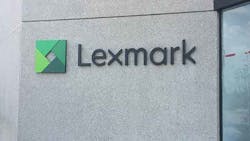Lexmark Software Unit Said to Attract Thoma Bravo, Vista
Lexmark International Inc., the computer-printer maker working with Goldman Sachs Group Inc. to seek strategic alternatives, has attracted first-round bids from private equity firms Thoma Bravo and Vista Equity Partners for its software division, according to people familiar with the situation.
The company has separately received interest from Japanese companies including Canon Inc. and Ricoh Co. for its hardware unit, said two of the people. As part of its strategic review, Lexmark is considering splitting itself and selling its hardware and software divisions to different buyers, the people said, asking not to be identified discussing private information.
Lexmark’s software unit had sales of about $148 million in the third quarter, or about 17 percent of the company’s total revenue, according to data compiled by Bloomberg. If its bid is successful, Thoma Bravo plans to combine the software business with one of its portfolio companies, Hyland Software Inc., one of the people said.
While Lexmark would prefer to sell the entire company together, no single buyer for both units has emerged, the people said. Lexmark’s enterprise software business includes image scanning and processing technology, while the hardware unit -- which makes up the rest of the company’s sales -- sells industrial printers to businesses and provides maintenance plans.
The company’s Imaging Solutions and Services unit, which houses its printing divisions, had revenue of $703 million in the third quarter.
Lexmark shares rose as much as 11.8 percent to $28.78, and were 10.7 percent higher at $28.49 at 3:01 p.m. in New York.
Representatives for Canon, Goldman Sachs, Lexmark, Ricoh and Thoma Brava declined to comment. A spokesman for Vista didn’t respond to requests for comment.
Lexmark, which has a market value of about $1.7 billion, has struggled to expand amid lower demand for its products. The company reported a 7.3 percent drop in third-quarter revenue to $851 million, its third consecutive quarterly year-over-year sales decline. Its shares have lost almost 40 percent in the last 12 months.
In October, the Lexington, Kentucky-based company said it hired Goldman Sachs to explore strategic alternatives, adding that no timetable has been set and there is no assurance that the move will result in a transaction.
“The board does not believe Lexmark’s current share price fully reflects the intrinsic value created by the company, and the board has concluded it is appropriate to explore strategic alternatives as the next step to unlock this value,” Jean-Paul Montupet, lead director of Lexmark’s board, said at the time.
About the Author
Bloomberg
Licensed content from Bloomberg, copyright 2016.
